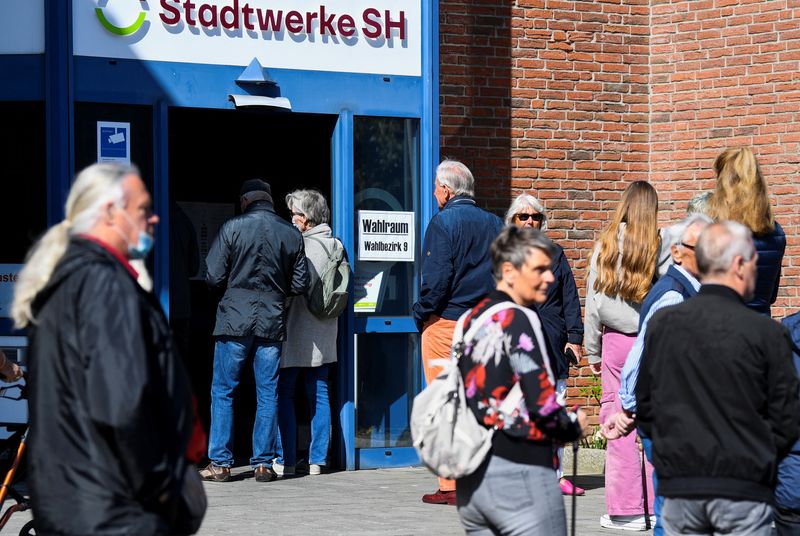By Riham Alkousaa
BERLIN (Reuters) -Germany's conservative CDU won an election in the northern state of Schleswig-Holstein on Sunday, a boost to the party of former Chancellor Angela Merkel, which was ousted from national government in federal elections last year.
An exit poll by infratest dimap put the Christian Democrats (CDU) at 43.5% of votes, up 11.5 percentage points from when Schleswig-Holstein last held a state election in 2017.
Chancellor Olaf Scholz's centre-left Social Democrats, the main party in Germany's "traffic light" coalition with the environmentalist Greens and liberal Free Democrats (FDP), meanwhile slumped to 15.9%, as it had presented a largely unknown candidate.
The exit poll put the Greens and FDP, which in Schleswig-Holstein have been in coalition with the CDU since 2017, at 18.1% and 6.4% respectively, meaning the conservatives may be able to form a government there with only one of the two parties.
CDU Secretary General, Mario Czaja, said the party will not make a recommendation from Berlin about which way state premier Daniel Guenther should proceed in deciding on a partner.
The CDU's stronger standing in the state than at the national level - where it is polling at 26% following its worst ever federal election result in September - is partly down to the popularity of Guenther, analysts say.
Another term for 48-year-old Guenther, who polls show is the most popular state premier in Germany, could strengthen the role of moderates within the CDU, in a counterpoint to their more right-wing leader Friedrich Merz, CDU sources told Reuters.
The South Schleswig Party (SSW), which represents the ethnic Danish minority in the state, won 5.8% of the votes while both the far-right AfD and far-left Linke parties did not reach the 5% of votes necessary to secure seats in the state's parliament.
More significant will be elections next week in Germany's most populous state of North Rhine-Westphalia (NRW), where the SPD and CDU are running neck and neck.
A loss by the conservatives in NRW, after losing in March in the tiny western state of Saarland, would be a significant blow to the party.
It would also make it easier for Scholz's SPD-Greens-FDP coalition to pass laws in the upper house of the national parliament, where regional elections help to determine the distribution of votes.
ENERGY TRANSITION
Regional issues such as the cost of childcare or property purchase taxes typically dominate such state elections.
But national issues are also in particular focus this year given the tectonic shift in German foreign, energy and security policy since Russia's invasion of Ukraine in February.
For one, Germany aims to accelerate the expansion of renewable energy to reduce its dependence on Russia as a supplier of oil and gas.
Located between the Baltic Sea and the North Sea, Schleswig-Holstein is one of Germany's leading states in wind power generation, with over 3,000 onshore and offshore wind turbines.
The Greens aim to increase the number of turbines and cut the minimum distance required between wind farms and residential buildings, while the CDU wants to raise the production capacity of existing wind farms without further increasing their number.
Schleswig-Holstein is also set to become home to one of Germany's two planned liquid natural gas (LNG) terminals, whose construction has been brought forward due to the Ukraine war. The Greens and the SSW, had previously opposed the project.

But they are not expected to strongly object anymore if they become part of the government given concerns over energy supply, according to Christian Meyer-Heidemann, the state's Commissioner Of Civic Education, a non-partisan office.
Battery maker Northvolt plans to open a third battery cell giga factory in the town of Heide in 2025, citing the state's high green power share.